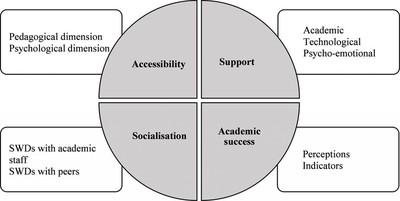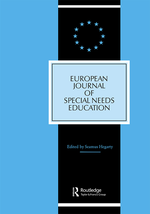Beyond accessibility: The role of support and socialization in the inclusion of online university students with disabilities

What do we know about interventions in online learning environments?
To answer this question we conducted a systematic review of academic interventions aimed at promoting the inclusion of students with disabilities in online higher education. This review was recently published in the European Journal of Special Needs Education and we present below its principal findings with a reflection on the lines on which such interventions should focus, as well as lines for future investigation.
The main objective of the review was to analyse the results obtained in academic interventions of an international scope aimed at evaluating the educational programmes, methodologies, assistive technologies and virtual platforms with which students with a disability interact. Furthermore, we set out to assess the extent to which these interventions have improved their academic success. In this regard, this systematic review brings together some of the most important aspects that must be taken into account when facilitating the participation of all students in online higher education, irrespective of their conditions, with a view to supporting them in achieving their academic goals.
Accessibility: the core focus of international interventions
According to the analysed evidence, interventions have focused mainly on improving the accessibility of virtual learning environments, assistive technologies, and learning content and resources. Accessibility is the first element that should be taken into account when designing both learning environments and curricula. Moreover, it is a key aspect that should be present in all the services and processes in which students are involved. However, our results (Figure 1) also reveal that there are other factors that play an important role in the academic success of students with disabilities in online higher education, such as processes of socialization on virtual campuses and the support services that their institutions provide to them on academic, technological and psycho-emotional issues.

These three elements go hand in hand in online learning in the university setting. For example, if students have resources adapted to their needs in the virtual campus, the teaching staff’s feedback should also be accessible and geared towards interaction. In other words, as well as having accessible resources, direct contact with their teachers and classmates is also very important for students with disabilities. Adopting this perspective, all students — and not only those who present some kind of disability — can benefit from an approach to learning that is based on a collaboration network, resolving any doubts that may appear, sharing their experiences and perspectives, and strengthening their academic motivation. The result is a stronger learning community in which the opportunities for all students to attain success in their academic goals are improved.
Meanwhile, we can also observe a clear inclination in educational interventions towards supporting the needs of students with sensorial and learning difficulties, which is a very positive aspect as both groups may experience accessibility difficulties in virtual campuses. However, there is a lack of research concerning covering the needs of other groups, such as students with mental health problems or cognitive difficulties. It would therefore be advisable to open up new lines of research in order to orient interventions in online higher education towards these specific groups, as well as to attain a deeper understanding of the influence of certain variables, such as gender, age, and type and severity of disability.
So what next? Some practical implications for promoting the inclusion of students who live with some form of disability
The results of our review may have a direct impact on the way that the UOC serves the needs of its students with disabilities in terms of academic adaptations and support services. Firstly, due to the specific nature of its educational model, which fosters interaction and collaborative learning. Secondly, because the UOC has a high presence, which has also been growing over recent years, of students with a recognized disability.
Therefore, the results of our research could be very useful in some specific areas of intervention, such as improving the services and resources that it currently provides to students with a disability or functional diversity. The UOC offers curricular adaptations aimed at making learning activities and the pace of work more flexible and developing a personalized assessment model. Furthermore, the resources are presented in a variety of formats to ensure they are accessible for all students and a great deal of work has been done to improve the accessibility of the virtual campus.
However, the results of the study suggest that it is also important to continue working to strengthen more direct interaction between students, academic staff and the support services. In addition, it is essential to promote communication between the various actors that make up the University staff. Accordingly, the ultimate goal must be to develop and enhance mechanisms to coordinate the improvement of academic support, diversify teaching strategies and implement curriculum adaptations.
Meanwhile, we should not forget that the results of our systematic review could be useful to other universities that are either fully online or blend online and face-to-face activities. This would allow both decision-makers and members of faculty to implement scientific evidence-based improvement actions to foster inclusion in online learning, which is now more necessary than ever due to the health crisis. Given that online education is constantly evolving, it would be advisable for higher education institutions to continue with their projects to improve the accessibility and flexibility of their resources and learning environments. It would also be beneficial for them to continue working on the implementation of a range of educational psychology strategies designed to complement accessibility aspects with a view to offering better learning opportunities in line with the diversity of the student body.
Our research in context
This work is part of a broader research project on the inclusion of students with disabilities at the UOC, which the predoctoral researcher José Israel Reyes is carrying out in collaboration with the Office of Attention to Diversity under the supervision of Dr Julio Meneses. In a broad sense, this is part of a line of work aimed at understanding the reasons that lead to the success of students at the UOC and, ultimately, its main concern is to improve the support they receive in developing and pursuing their academic paths at our university. In connection with this line of research, this project proposes studying the impact of contextual factors on the academic trajectories of students with disabilities and on their academic success, paying special attention to the differences in their experience according to their type of disability. As well as familiarizing ourselves with the experiences of the students at our university, this project proposes putting the newly-generated knowledge at the service of improving the academic support that the university offers to students with some kind of disability.
To carry out this project, we are currently analysing interviews held with a sample of students with different disability profiles at different stages of their studies. The purpose of these interviews is to explore the views of these students with regard to their previous experience in online studies, their personal situation, their relations with other people both at the University and elsewhere, and the support they receive from their teachers and tutors and Student Services. We are also conducting interviews with UOC instructors and academic advisors who have direct experience in supporting students with disabilities. These interviews will help us to determine the main practices they develop to attend to the specific needs of these students and also to identify future opportunities for improvement based on their own experience.
Once all the interviews have been analysed and the perspectives of all the stakeholders have been compared, we will integrate the results of the project with a view to suggesting effective ways of improving the support that students with disabilities receive at the UOC. In line with the evidence that has made it possible for us to analyse the systematic review of international literature, our main focus will be on socialization processes in the virtual campus, the learning environment that is fostered in the classrooms, and direct, effective communication between everyone involved in the educational process.
Finally, we would like to express our infinite gratitude for the participation and collaboration of all those involved in this project, especially the students who agreed to share their experiences. Without their personal accounts and expectations in relation to the institution, it would be impossible to understand the challenges to be overcome to become a truly inclusive university that promotes the success of all its students.
Further reading

